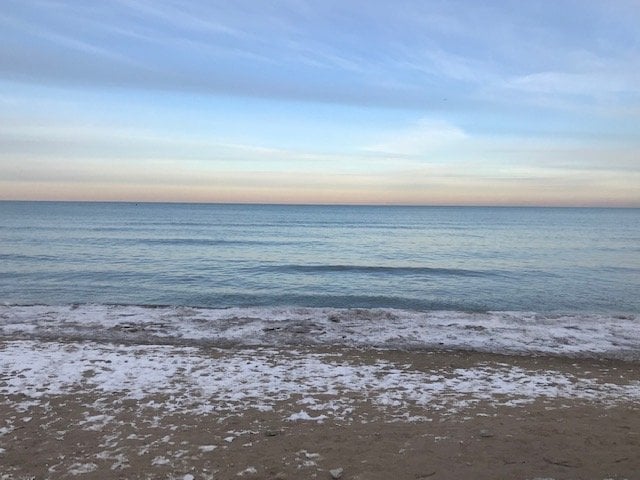Evanston to offer three free weekly beach days after advocacy against token sales
Daily file photo by Maia Spoto
A lakefront at sunset. All Evanston beaches will be free to access Saturdays through Mondays this summer, though beach passes will remain for sale.
May 25, 2021
Residents will have free access to Evanston beaches on Saturdays, Sundays and Mondays starting this summer.
City Council was initially set to vote Monday on a resolution proposed by Ald. Devon Reid (8th) discontinuing the sale of beach tokens and refunding tokens already sold, which would have made Evanston beaches free seven days a week.
Alderpeople unanimously voted for an amended resolution after a contentious debate that lasted multiple hours and included a suspension of procedural rules. The city will also develop a budget to allow all residents free access to Evanston beaches every day during summer 2022 and beyond.
“We don’t charge for access to any other (public) place,” Reid said. “What they’re paying for is to keep Evanston residents who can’t afford to frequent our beaches out.”
Parks, Recreation and Community Services Department Director Lawrence Hemingway said getting rid of the beach token system in the middle of a fiscal year would create a $1 million gap in revenue for the Parks Department. Reid said even a $1 million revenue loss could be absorbed by the city’s general fund without dropping below the amount the city reserves in the fund full-time.
Ald. Jonathan Nieuwsma (4th) motioned to replace this resolution with another that provides free beach access on Sundays and Mondays, with the intent to pilot free access to all Evanston beaches in summer 2022. Ald. Clare Kelly (1st) then brought up a proceeding proposal to expand free access to Saturdays, Sundays and Mondays, which council unanimously passed.
The change in city policy comes after ongoing advocacy by residents against beach tokens. Earlier this month, Evanston Fight for Black Lives created a petition — which has since garnered over 6,500 signatures — demanding Mayor Daniel Biss and City Council pass free beach access for all residents. Free beach access is a step towards the city’s recent resolution towards racial equity, given the token system’s history of explicitly barring Black residents from beaches, the petition said.
“Two factors make beach tokenism racist; the policy’s original intent, and its impact,” Evanston Township High School teacher Abdel Shakur said. “Beach tokens are just one item in a suite of racist systems that destabilize Black lives to prioritize White comfort and power.”
In an effort to expand beach access, EFBL will host an initiative this summer to raise additional funds to pay for beach tokens.
This will allow residents to obtain free tokens without providing income documentation to the city, EFBL organizer Sarah Bogan said.
“There’s no dispute that the barrier of beach tokens is classist and racist,” Bogan said. “We believe that everyone should have access to public property.”
Since beach tokens went on sale in April, about 4,000 have been sold to residents of Evanston, Skokie and Chicago, according to Hemingway.
Some residents under a certain income level can currently claim a free beach token at the Lorraine H. Morton Civic Center, under programs including Evanston/Skokie School District 65’s fee assistance for residents in zip codes 60201 and 60202.
However, resident Karla Thomas said the process of standing in line and presenting income documentation can be dehumanizing.
“Technically, everybody is allowed to get to the beach if they want to, if they only subjugate themselves, go down to (the Civic Center), prove that they are poor enough, and beg,” Thomas said.
Ald. Cicely Fleming (9th), Shakur and Thomas said there’s a long way to go in making Black and brown families feel welcome on Evanston beaches regardless of cost. Thomas said her children have a hard time finding others who look like them on an average Evanston beach day, and Shakur said his family often feels scrutinized by predominantly White beachgoers during the summer.
Regardless of whether beaches are free, Fleming said most are still not accessible under the Americans with Disabilities Act. She criticized the council’s discussions about diversifying public spaces by lowering access costs, saying they unfairly associate poverty with the experiences of Black and brown residents.
“We talk a lot in this community (about) ‘if we want to diversify spaces, we have to make them free,’” Fleming said. “That comes from a very deficit model, and the assumption that everybody Black in town is poor… let’s just please be mindful of that stereotype that we put into our community.”
Email: ilanaarougheti2023@u.northwestern.edu
Twitter: @ilana_arougheti
Related Stories:
— Evanston beach passes available for purchase beginning Monday
— How Evanston’s beach tokens create an access barrier to Lake Michigan



